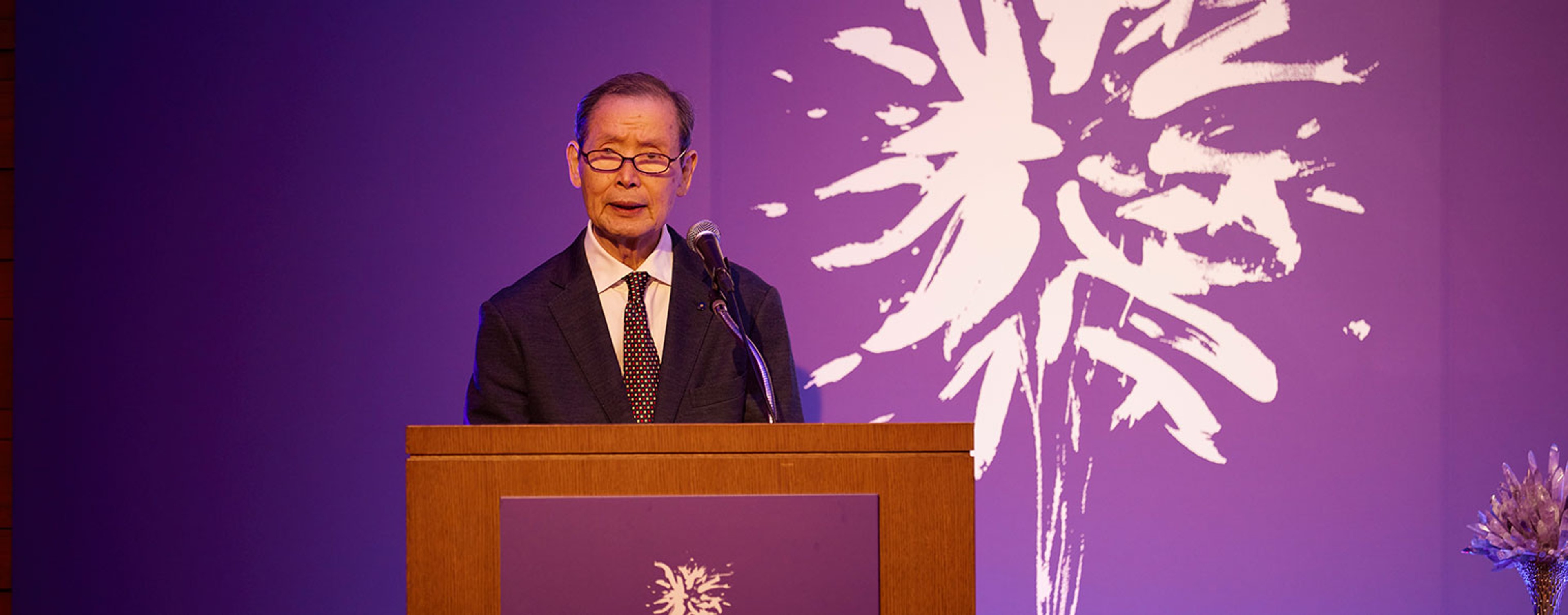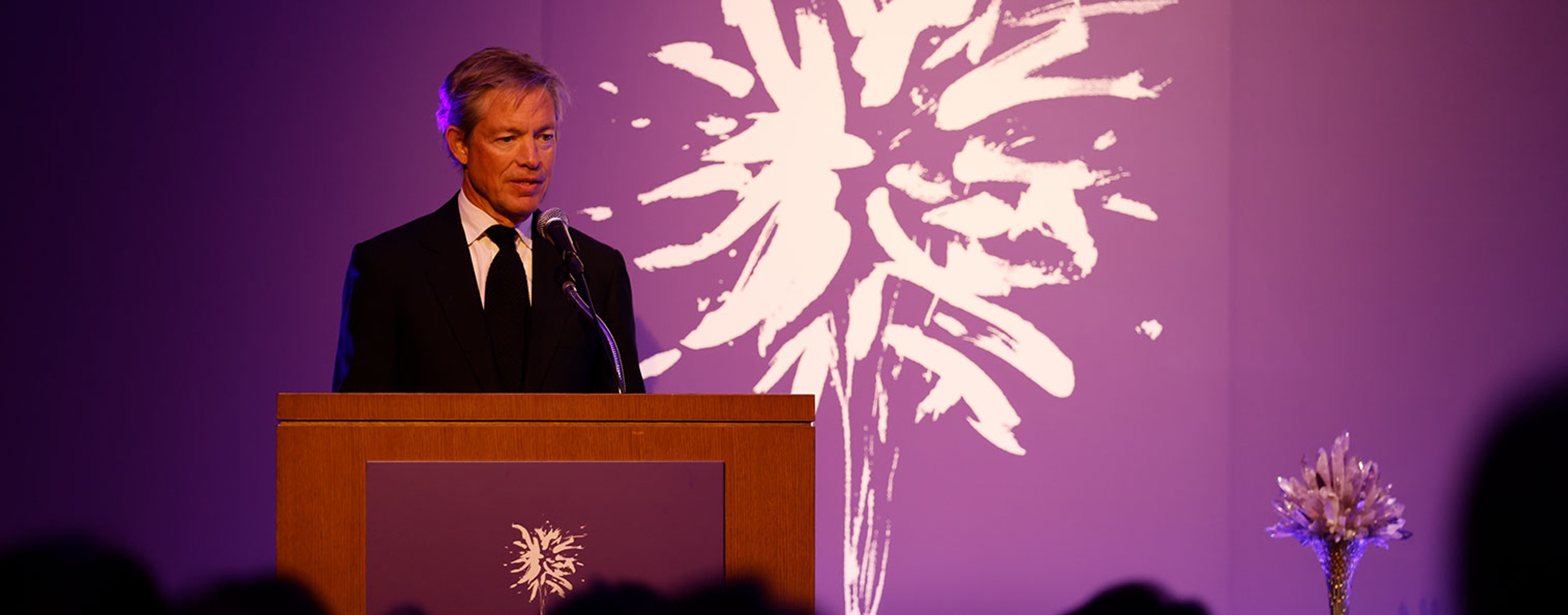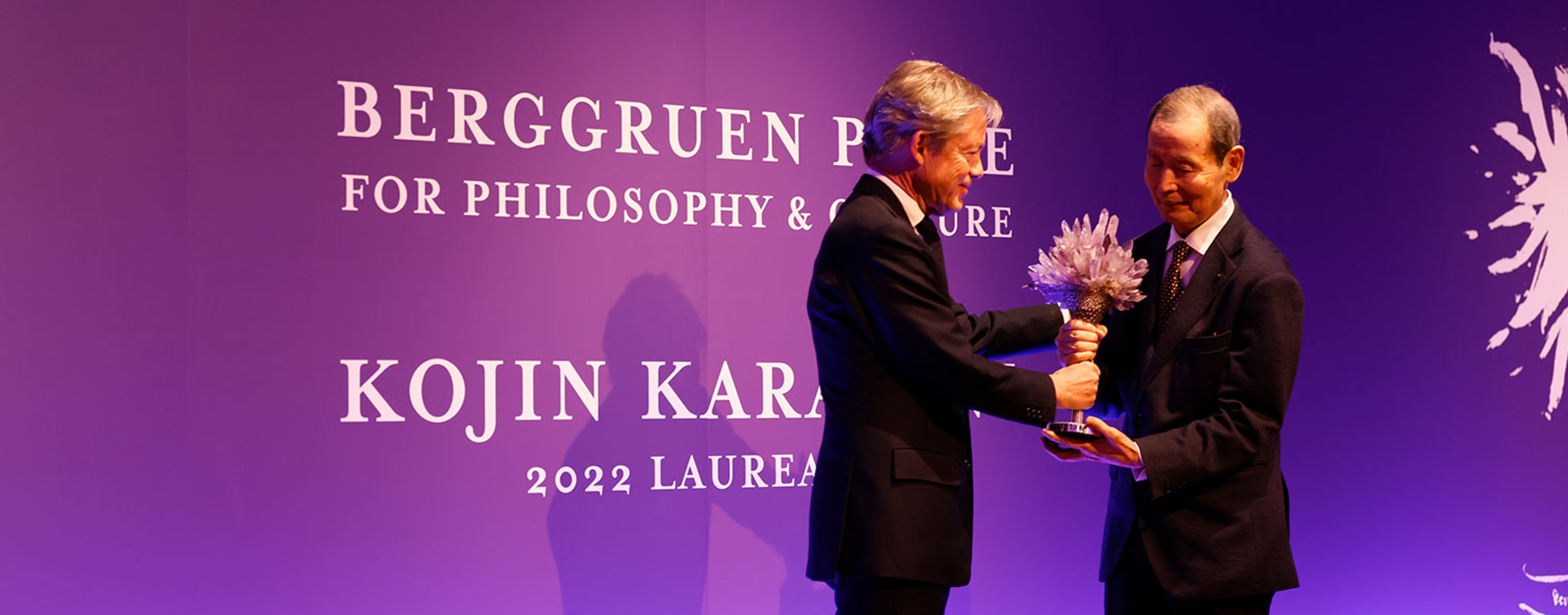Kojin Karatani Berggruen Prize Remarks



At the beginning of October last year, I heard from the Berggruen Institute that they had chosen me the winner of the year’s prize. I was taken aback. I have never thought that I would win such a major prize. But when I read the selection comments, I was even more surprised. I felt that Mr. Berggruen and the jury had understood my works even better than myself.
Never before have I felt such a deep appreciation of the significance of my works. Especially in Japan, although I have gained support from general readers, I have not been taken seriously by scholars. However, according to the selection committee comments, it was precisely my cross-disciplinary approach, which is not bound by any specialization, that made it possible to point toward an alternative to the current society.
I have dealt with matters in many different areas, but if I were to sum up my work in one word, it would be my focus on modes of exchange. I am sure that some people here are not familiar with my mode of exchange theory, so let me explain it briefly.
I conceived the idea for this from Marx’s Capital, but neither in the past nor in the present has anyone paid much attention to Marx’s focus on exchanges. Normally, Marxism or historical materialism emphasizes the mode of production, namely the production power and the mode of production as the economic substructure and base.
Criticism of such ideas has been around since the end of the nineteenth century. For example, Max Weber and Freud each agreed with the idea of historical materialism, but at the same time emphasized the ideational “power” in the superstructure that does not come from the production powers. They sought it in religions and the unconscious. Moreover, Engels himself in his later years recognized the power of such a superstructure and stated that we should consider various factors, not just the economic base. So today, rather, that is the standard view of Marxism. This is also pervasive as common wisdom. For example, the perspective of how the introduction of AI will change society is based on the mode of production.
However, I am not satisfied with such a view. In my thinking, the ideational “power”, which Weber and Freud sought to find in religion and the unconscious in fact comes from the economic dimension. But it comes from the mode of exchange, not from the mode of production. For example, the power of money and capital comes from exchange. And, in fact, Marx in Capital found it there, as well.
Marx believed that the fetish of money was formed from the exchange of commodities. Subsequently, he tried to capture the process in which the fetish developed from merchant capital to industrial capital and eventually enveloped the whole world. In other words, he tried to depict the development of this fetish in Capital. Thus, he called himself “a student of Hegel”. This indicates that Capital can be understood as “The Phenomenology of Fetish”, which examines the development of the fetish.
But the Marxists did not take this seriously. Since Lukács, they have dismissed Marx’s concept of the fetish as a mere joke. Lukács also emphasized that in a capitalist economy, human-to-human relationships become object-to-object relationships, that is, reification occurs. But as I see it, this is not the case. In Capital, a perspective that had not existed before Marx was disclosed. It is the insight that the exchange of goods is the source of the fetish of capital, a mysterious spiritual power that puts human beings under its control.
In fact, however, Marx was not the first to associate this kind of spiritual power with exchange. Before him, there was another thinker who viewed state power as a spiritual power arising from exchange. This was Hobbes, the author of Leviathan. He located this in the exchange of “obedience and protection”. For example, a vassal obeys the king. But this is not because the king has power. A king’s power derives from the “exchange” in which the king protects his subjects if they obey him. However, such an exchange is different from the exchange of goods. So, the spiritual power that comes from it is also different.
In other words, spiritual “powers” arise from exchange, but they are different according to the different modes of exchange. The spiritual power that Marx focused stems from the exchange of commodities, mode C, whereas the spiritual power that Hobbes focused arises from the exchange of “obedience and protection”, mode B.
In addition to these two types of powers, there is another kind of spiritual power that arises in the exchange of gift giving and returning; it is the power that mode of exchange A generates. It was the anthropologist Marcel Mauss, the author of The Gift, who first brought attention to this. But he, too, has been criticized even by his admirers such as Levi-Strauss for his invocation of what they consider to be a dubious spiritual power.
I recognized a common perception in the work of such thinkers as Marx, Hobbes, and Mauss. That is, each of them focused on the spiritual power arising from exchange, that is, a “power” beyond human will. And what they share in common is that, contrary to what is clear from their own writings, this power has been dismissed by others as mere metaphor. As a result, we have lost sight of the ideational power arising from exchange, which they all saw. In short, the scientific view is that there is no such thing as spiritual power.
For example, Marxism’s goal is to first seize state power and thereby curb the capitalist economy. It was thought that if capital disappeared in this way, then the state would naturally disappear. But that is not the case. The state remains. The same can be said for nations. Capital, state, and nation, respectively, will remain. Because each of them has spiritual power. They do not exist by human choice. And the combination of capital-nation-state is still dominant today in the 21st century and will continue to remain so. And this is a system with fatal flaws – war, poverty, discrimination, etc.
These powers are extremely difficult to contain. That being the case, what should we do? In The Structure of World History, I explored the notion of mode of exchange D as a power that transcends the others. It consists of the restoration of mode of exchange A in a higher dimension. But after writing this book, I felt the need to rethink mode D.
Many readers seemed to think that D would be realized if humans were to aim for it. However, D cannot be realized by our will. That said, I am not saying the readers are misreading my books. The way I write, or rather the way I think, is flawed. This problem is what has pestered me for the last ten years.
Recently, I found a new approach to this problem. The result is a book called Powers and Modes of Exchange. At the end of this book, I wrote: D is the restoration of mode A, in other words reciprocity, in a higher dimension, which is not achievable by our will. We can only work towards realizing mode A. However, that alone cannot supersede the nation and capital. That means that we cannot realize D. Then how is D possible? I wrote: “D comes from elsewhere”. For details, please read this book. Its English translation is scheduled to be published early 2025.
This book was published last year on October 6th, and in fact, it was just around that time that I received the news that I had been selected for the Berggruen Prize. At that time, I felt a strange sense of wonder.
This is what I thought. I never imagined that I would receive such an award. I did not expect it, nor did I even wish for it. But it came. Not by my will or desire, but “from elsewhere”. I thought that it may be in this kind of way that D will arrive. It comes unexpectedly and brings joy. Even if it is not possible in my lifetime, I feel that D will arrive in the not-too-distant future. Today, I wished to share that thought with you.
Thank you very much for your attention.